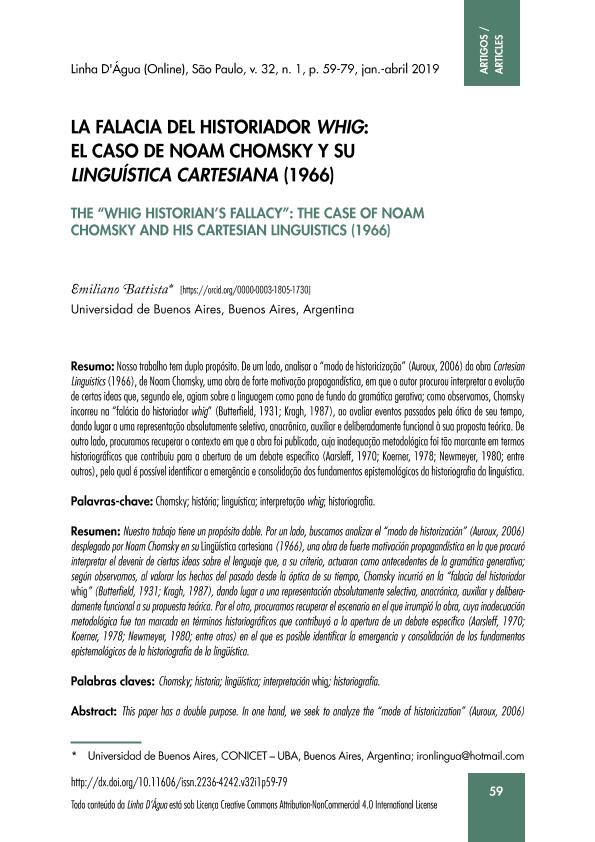Artículo
Nuestro trabajo tiene un propósito doble. Por un lado, buscamos analizar el “modo de historización” (Auroux, 2006) desplegado por Noam Chomsky en su Lingüística cartesiana (1966), una obra de fuerte motivación propagandística en la que procuró interpretar el devenir de ciertas ideas sobre el lenguaje que, a su criterio, actuaron como antecedentes de la gramática generativa; según observamos, al valorar los hechos del pasado desde la óptica de su tiempo, Chomsky incurrió en la “falacia del historiador whig” (Butterfield, 1931; Kragh, 1987), dando lugar a una representación absolutamente selectiva, anacrónica, auxiliar y deliberadamente funcional a su propuesta teórica. Por el otro, procuramos recuperar el escenario en el que irrumpió la obra, cuya inadecuación metodológica fue tan marcada en términos historiográficos que contribuyó a la apertura de un debate específico (Aarsleff, 1970; Koerner, 1978; Newmeyer, 1980; entre otros) en el que es posible identificar la emergencia y consolidación de los fundamentos epistemológicos de la historiografía de la lingüística. Nosso trabalho tem duplo propósito. De um lado, analisar o “modo de historicização” (Auroux, 2006) da obra Cartesian Linguistics (1966), de Noam Chomsky, uma obra de forte motivação propagandística, em que o autor procurou interpretar a evolução de certas ideas que, segundo ele, agiam sobre a linguagem como pano de fundo da gramática gerativa; como observamos, Chomsky incorreu na “falácia do historiador whig” (Butterfield, 1931; Kragh, 1987), ao avaliar eventos passados pela ótica de seu tempo, dando lugar a uma representação absolutamente seletiva, anacrônica, auxiliar e deliberadamente funcional à sua proposta teórica. De outro lado, procuramos recuperar o contexto em que a obra foi publicada, cuja inadequação metodológica foi tão marcante em termos historiográficos que contribuiu para a abertura de um debate específico (Aarsleff, 1970; Koerner, 1978; Newmeyer, 1980; entre outros), pelo qual é possível identificar a emergência e consolidação dos fundamentos epistemológicos da historiografia da linguística. This paper has a double purpose. In one hand, we seek to analyze the “mode of historicization” (Auroux, 2006) practiced by Noam Chomsky in his Cartesian Linguistics (1966), a work of strong propagandizing motivation in which he tried to interpret the evolution of certain ideas about language that, in his opinion, acted as antecedents of generative grammar; we observed that, when he considered the facts of the past from the perspective of his time, Chomsky fell into the “whig historian’s fallacy” (Butterfield, 1931; Kragh, 1987) and offered an absolutely selective, anachronistic, auxiliary representation, and deliberately functional to his theoretical proposal. On the other hand, we try to reconstruct the scenario in which the work appeared, whose methodological inadequacy was so marked in historiographical terms that contributed to the opening of a specific debate (Aarsleff, 1970; Koerner, 1978; Newmeyer, 1980; among others) in which it is possible to identify the emergence and consolidation of the epistemological foundations of linguistic historiography.
La falacia del historiador Whig: El caso de Noam Chomsky y su lingüística cartesiana (1966)
Título:
The “Whig historian’s fallacy”: the case of Noam Chomsky and his cartesian linguistics (1966)
Fecha de publicación:
11/04/2019
Editorial:
Universidade de São Paulo. Faculdade de Filosofia, Letras e Ciências Humanas
Revista:
Linha D Agua
ISSN:
0103-3638
e-ISSN:
2236-4242
Idioma:
Español
Tipo de recurso:
Artículo publicado
Clasificación temática:
Resumen
Palabras clave:
CHOMSKY
,
HISTORIA
,
LINGÜÍSTICA
,
HISTORIOGRAFÍA
,
INTERPRETACIÓN WHIG
Archivos asociados
Licencia
Identificadores
Colecciones
Articulos(SEDE CENTRAL)
Articulos de SEDE CENTRAL
Articulos de SEDE CENTRAL
Citación
Battista, Emiliano; La falacia del historiador Whig: El caso de Noam Chomsky y su lingüística cartesiana (1966); Universidade de São Paulo. Faculdade de Filosofia, Letras e Ciências Humanas; Linha D Agua; 32; 1; 11-4-2019; 59-79
Compartir
Altmétricas




